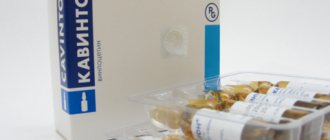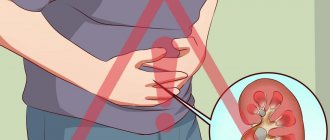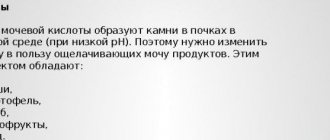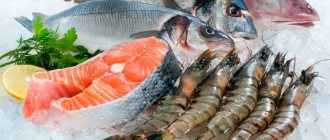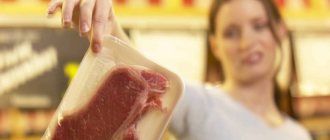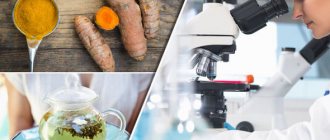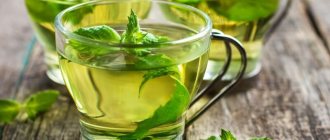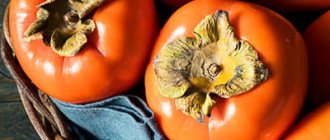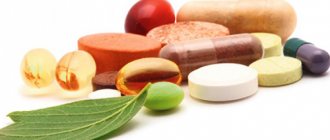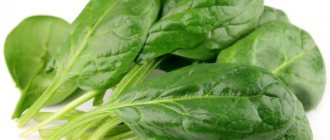Prevention of the formation of kidney stones and treatment of patients with urolithiasis and urolithiasis is not possible without a properly selected diet (diet therapy) and periodic monitoring of the acid-base state of urine. A rational diet helps restore normal metabolism and maintain homeostasis.
The reaction of urine determines the possibility of stone formation. Urate stones in an acidic environment, oxalate stones in a neutral acidic environment, phosphate stones in a more alkaline environment. Using pH test strips or an inexpensive, hand-held electronic pH meter, you can easily, quickly and accurately monitor your urine's response to a selected diet. Positive pH dynamics can serve as a criterion for the correctness of the chosen diet or treatment.
Limit foods high in calcium oxalate
Kidney stones can be made up of many different compounds, but the most common stones are calcium oxalate (salts and esters of oxalic acid)—at least 67% of kidney stones contain it.
Consuming foods rich in calcium along with foods containing oxalates may reduce the risk of stone formation: in this case, the oxalates can be bound before they reach the kidneys.
Foods rich in oxalic acid:
grapefruit and cranberry juice, roasted potatoes, spinach, cashews and peanuts, sorrel and rhubarb, beets, asparagus, celery and parsley, tomatoes, eggplant, bell peppers.
Calcium rich foods:
A good source of calcium is most dairy products. In addition to them, they contain a lot of calcium: canned fish with bones, tofu, dried apricots, raisins, pumpkin seeds, soybeans, lettuce, green onions, carrots.
Dish recipes
Proper nutrition for kidney stones can easily be made not only healthy, but also tasty. There are a lot of original recipes that will diversify the menu:
- baked potatoes under a layer of hard cheese with herbs are an excellent puff dish served hot;
- boiled potatoes baked in the oven with Bechamel sauce;
- omelette with vegetables (with the addition of carrots and cabbage) in the oven;
- diet omelette with rice in the oven;
- omelette with cheese without oil in the oven;
- fish cakes, which are steamed from minced fish; pollock, pike perch, and ice fish are suitable for the recipe;
- lean cabbage rolls with buckwheat, you can season with low-fat sour cream, but the total calorie content of the meal will increase;
- cottage cheese casserole with apples and semolina;
- pepper stuffed with cottage cheese, baked in the oven;
- cold beetroot soup;
- creamy tomato soup with rice.
For dressing salads, you can prepare homemade diet mayonnaise. Prepared from vegetable oil, eggs, sugar with the addition of a solution of citric acid. The egg yolks are separated from the whites, then sugar is added to the yolks and beaten until smooth. A solution of citric acid, salt and other seasonings to taste are poured into the resulting homogeneous mass. This sauce can be used to season your favorite salads, various recipes from fish, meat and seafood. https://www.youtube.com/watch?v=iFW7UK-K6js
Eat less foods that increase acidity
Highly acidic urine can increase the risk of kidney stones and make the stones more painful. Elevated – these are pH values from 4.5 to 5.5. Constant acidity levels within these limits are a prognostic sign of the formation of urate and oxalate stones. To reduce the acidity of urine, you must first reduce your intake of protein foods.
Foods that increase urine acidity
: red meat and pork, poultry, fish, most cheeses, especially Parmesan, eggs.
Russian doctors explained which foods lead to the formation of kidney stones.
Among the most dangerous are food additives. Medical experts have found out which foods cause kidney stones to form. It turned out that the most dangerous are food additives, and this list is headed by calcium, which many use to maintain bone strength. informs about this
It turned out that excessive calcium consumption can cause disease of the paired organ, osteoporosis and bone loss. In second place in terms of harmfulness is salt. Yes, the same one, the one that all people use every day. It tends to linger in the body, which disrupts the normal process of urine excretion. As a result, the kidneys feel additional stress when working. It is possible to fight this. It is necessary to limit salt intake to 3 grams per day. But, as experts note, it is difficult to control the amount of the “insidious” mineral eaten, because salt is contained in many prepared foods.
Nutrition experts believe that you can protect your body from unnecessary and dangerous illnesses by eliminating processed foods, sausages, baked goods, instant soups and bouillon cubes from your diet. In addition, products containing calcium, milk, cottage cheese, sour cream should also be limited in consumption. It is also necessary to know when to stop when consuming eggs, cabbage, legumes and black bread. Their total daily intake should be no more than 1200 grams. But a more accurate calculation is made based on the person’s body weight.
Do not form on their own? They are the result of your diet and your lifestyle! Don't let them form, find out what foods trigger the formation of stones!
If you already have a problem like kidney stones, then the food you choose will help you crush and remove them. There are also foods that can make your condition significantly worse.
Read this immediately!
Take care of yourself, smile more often and!
What you should know about kidney stones
Before we talk about foods to avoid if you suffer from kidney stones, we would like to tell you more about what this disease is.
These stones are formed from microscopic particles called crystals. Most people do not have such particles in their urine. But the work of each organism has its own nuances.
In most cases, stones are formed from oxalates and calcium.
It is these stones that are found in people in 75% of cases.
Treatment for each patient is prescribed individually, as it depends on the substances that form kidney stones. The size of the stones and the frequency with which they appear in the patient are also important.
What signs and symptoms indicate kidney stones?
- Pain in the lower part, in the hypochondrium, and also in the sides
- Intense pain for 20-60 minutes
- Pain spreading to the abdomen and groin area
- Blood in urine
- Dark urine with an unpleasant odor
- Pain when urinating
- Incessant desire to urinate. At the same time, when you go to the toilet, only a few drops of urine are released.
- Nausea
- Vomit
- Cold sweat
- High temperature (in case)
Types of stones
Stones formed in the kidneys are divided into several groups based on their chemical composition. These include:
- calcium, which include oxalate and phosphate stones;
- urate;
- mixed;
- protein;
- cystine;
- cholesterol
Most patients who go to the doctor with complaints of renal colic are found to have calcium and urate stones. The remaining species are formed quite rarely. Therefore, it is advisable to consider which diet helps improve the condition of patients with the first two types of stones.
Oxalate stones are formed due to deposits of calcium salts of oxalic acid. At the same time, the acid-base balance of urine does not change in people. A special feature of such stones is their insolubility. Therefore, the only treatment to remove the stone is surgery. They are formed due to excessive consumption of vegetables and fruits containing oxalic acid, for example, sorrel, spinach and citrus fruits.
Phosphate stones are formed as a result of deposits of calcium salts of phosphoric acid when the urine balance changes towards alkalization. Such stones dissolve under the influence of mineral water and fruit acids.
Urate stones are formed when the excretion of uric acid is impaired. And the main reason for their appearance is gout. They are formed in an acidic environment, dissolving under the action of alkalis.
Kidney stones and nutrition
A properly selected diet may be enough to prevent the formation of new stones.
Most likely, your doctor will recommend that you limit your salt intake.
In addition to salt, you should avoid foods containing substances such as:
- Calcium
- Sodium
- Oxalates
- Potassium
If kidney stones are formed from calcium, it is necessary to exclude salt from the diet. This applies not only to salt alone, but also to foods high in this substance. At the same time, you need to minimize your calcium intake.
It is also worth keeping in mind that in this case, kidney stones can trigger the development of diseases and problems such as osteoporosis and bone loss.
If oxalates are the culprit in stone formation, you need to reduce your intake of foods containing these substances.
These include:
- Peanut
- Beet
- Blackberry
- Strawberry
- Raspberries
- Currant
- Rhubarb
- Grape
- Chocolate
- Parsley
- Green salads, spinach
- Oranges
- Wheat flour
- Brewer's yeast
- Pepper
- Walnuts
- Potato
It has also been proven that sugar abuse can also be a decisive factor in the development of the disease. This is because sugar disrupts the absorption of calcium, magnesium and other minerals found in the human body.
You should also be careful with carbonated drinks and juices from supermarkets.
As a rule, their labels indicate that the drinks have low energy value. In fact, they contain large amounts of sugar. Therefore, they cannot be attributed to the amount of liquid that you need to drink during the day.
The amount of fluid our body needs depends on many factors. These can be included.
You may never have thought about it, but if you have kidney stones, you need to take your diet seriously. In your situation, proper nutrition is vital. After all, the food you choose can help you cure kidney stones. There are also foods that can make your condition worse. This article will help you take a fresh look at this issue.
What do you need to know before cleansing?
Urolithiasis is characterized by the formation of stones of different types, sizes and shapes in the urinary tract.
- Calcium oxalates (oxalic lime).
- Calcium or potassium phosphates.
- Urates (salts of uric acid).
- Calcium carbonates.
These stones account for up to 85% of all cases of disease. Less common are struvite (mixed formations), cholesterol, protein and cysteine stones.
Before you begin cleansing your kidneys by consuming foods, it is important to undergo a medical examination. It is imperative to find out the type, size and number of stones in the urinary tract. If there are large or coral-shaped formations, self-cleansing of the kidneys at home is prohibited!
- Eliminate conditions for stone formation.
- Create conditions for the dissolution of large formations to the state of sand.
- Provide conditions for removing stones from the urinary tract.
Only in this way will cleansing the kidneys be effective and give noticeable results.
What you should know about kidney stones
Before we talk about foods to avoid if you suffer from kidney stones, we would like to tell you more about what this disease is.
These stones are formed from microscopic particles called crystals. Most people do not have such particles in their urine. But the work of each organism has its own nuances.
In most cases, stones are formed from oxalates and calcium. These stones are found in people in 75% of cases.
Treatment for each patient is prescribed individually, as it depends on the substances that form kidney stones. The size of the stones and the frequency with which they appear in the patient are also important.
What signs and symptoms indicate kidney stones?
- Pain in the lower back, hypochondrium, and sides
- Intense pain for 20-60 minutes
- Pain spreading to the abdomen and groin area
- Blood in urine
- Dark urine with an unpleasant odor
- Pain when urinating
- Incessant desire to urinate. At the same time, when you go to the toilet, only a few drops of urine are released.
- Nausea
- Vomit
- Cold sweat
- High temperature (in case of infection)
Kidney stones and nutrition
A properly selected diet may be enough to prevent the formation of new stones. Most likely, your doctor will recommend that you limit your salt intake.
In addition to salt, you should avoid foods containing substances such as:
- Calcium
- Sodium
- Oxalates
- Potassium
- Squirrels
If kidney stones are formed from calcium, it is necessary to exclude salt from the diet. This applies not only to salt alone, but also to foods high in this substance. At the same time, you need to minimize your calcium intake.
It is also worth keeping in mind that in this case, kidney stones can trigger the development of diseases and problems such as osteoporosis and bone loss.
If oxalates are the culprit in stone formation, you need to reduce your intake of foods containing these substances. These include:
- Peanut
- Coffee
- Beet
- Beans
- Blackberry
- Strawberry
- Raspberries
- Currant
- Rhubarb
- Grape
- Chocolate
- Parsley
- Green salads, spinach
- Oranges
- Wheat flour
- Beer
- Brewer's yeast
- Tofu
- Pepper
- Walnuts
- Potato
It has also been proven that sugar abuse can also be a decisive factor in the development of the disease. This is because sugar disrupts the absorption of calcium, magnesium and other minerals found in the human body.
You should also be careful with carbonated drinks and juices from supermarkets. As a rule, their labels indicate that the drinks have low energy value. In fact, they contain large amounts of sugar. Therefore, they cannot be attributed to the amount of liquid that you need to drink during the day.
The amount of fluid our body needs depends on many factors. These include:
- Age
- Weight
- Floor
- Height
- Human physical activity
- Season
- Presence of other diseases (overweight, diabetes, high cholesterol)
Less concentrated and more dilute urine reduces the risk of stone formation. The only way to achieve this is to drink more water.
On the other hand, it is very important to pay attention to the amount of protein consumed. Evidence from various studies suggests that animal proteins are harmful to the health of people prone to kidney stones.
Of course, this is not at all about the need to become a vegetarian. Not at all. But it is recommended to think about how many times a week you consume foods such as:
- Beef
- Poultry meat
- Pork
- Fish
Eggs and dairy products are also sources of animal protein. Try to minimize consumption of foods high in milk, cheese and butter.
But what about vitamins?
Some of them can benefit you, while others can harm you. There are also vitamins that have no effect on the formation of kidney stones:
- Vitamin B
(niacin, riboflavin and thiamine): There is no evidence that these vitamins are contraindicated in patients suffering from kidney stones. Don't forget that vitamin B2 gives urine a yellowish color.
This can cause confusion when analyzing the color of urine during an attack.
- Vitamin C
: Citrus fruits and other fruits and vegetables contain large amounts of this vitamin. It protects our body from flu and colds and improves our immunity. But at the same time, vitamin C can provoke the formation of kidney stones.
If you suffer from kidney stones, you need to reduce your intake of foods high in vitamin C.
Salt
Salt consumption should perhaps be given special attention. We have already talked about the role of salt in the formation of kidney stones. Do not underestimate the importance of this product in the development of this unpleasant disease. The issue of salt consumption is not as simple as it might seem at first glance.
Don't forget that when we eat a lot of salt, our kidneys are forced to work twice or even three times as hard. The load on these organs increases greatly.
When the doctor tells us that it is necessary to limit our salt intake, we remove the salt shaker from the table and stop adding salt to our dishes.
But what about food that already contains large amounts of this substance? But the shelves of all supermarkets and markets are filled with such products.
It is worth keeping in mind that these products can greatly harm your health:
- Instant soups
- Bouillon cubes
- Meat products and sausages
- Fast food
- Pies
- Bicarbonate of soda
- Flour for frying
As we have already said, you need to pay great attention to the products you choose and their ingredients. It is possible that the culprit in the formation of kidney stones is the food you eat, and you don’t even know it. published
PS And remember, just by changing your consumption, we are changing the world together! © econet
The National American Institute of Health indicates that every 10th person on the planet has kidney stones. This phenomenon is called urolithiasis. Women suffer from this disease much less often than men. It is worth noting that the disease does not go unnoticed. It is accompanied by sharp pain attacks, which in some cases end in hospitalization. Very often doctors have no choice but to perform an operation. What can contribute to the formation of stone? In this article, we will look at a list of foods that cause renal destabilization.
Steps
Fight leg cramps with stretching exercises
- Stretch your calf muscles with a towel.
Sit down, stretch your affected leg out in front of you, and place a towel over the ball of your foot. Grasp the ends of the towel with your hands and pull them towards you: while doing this, you should feel how the calf muscles stretch. Hold the stretch for 30 seconds. Repeat the exercise 3 times.
- This stretch compresses the leg and effectively massages it.
- Be careful not to apply too much force to avoid damaging your leg further. Stop doing the exercise if you feel pain in your calf.
- Sit and lean forward to stretch your inner calf muscles.
In a sitting position, extend your affected leg in front of you, bend the other leg and lean forward so that your chest is closer to your knee. Grasp the underside of the toes of your outstretched leg with your hands and pull them towards you.
- If you are unable to fully complete this stretch, simply lean forward and extend your arms as far as possible towards the toe of your sore leg.
Lean forward and place your palms on the wall, then step forward with your good leg. The affected leg should remain straight. Slowly shift your body weight onto your forward leg until you feel a stretch in the calf muscles of your affected leg. In this case, the foot of the affected leg should remain completely on the floor. Hold the stretch for 15–30 seconds.
- You should repeat this stretch until the calf cramps go away.
This stretching can also be performed before bed as a preventative measure to prevent nighttime leg cramps.
Lie on your back and bend your healthy leg at the knee so that your foot remains flat on the floor. Stretch and lift the affected leg and reach it with your hands (the leg should remain straight). Hold the stretch for 10–15 seconds.
- Pull your leg toward you by the back of your thigh, not your knee, to give your hamstrings and tendons a good stretch.
If you are unable to keep your raised leg straight, simply try to extend it as far as possible to feel the tension in the muscles.
Home Remedies to Relieve and Prevent Leg Cramps
- Don't pull the sheets too tight.
A tight sheet may cause your toes to subconsciously curl, causing your calf muscles to cramp. The sheets should not be pulled tightly, otherwise the feet may remain in one position for too long, which contributes to cramps.
- While sleeping, hanging your feet over the edge of the bed with your toes pointing down can also help avoid muscle tension and cramps.
- Apply hot compresses to the area where the cramps occur.
Heat is good for relaxing tense muscles and relieving pain. Use a heating pad, a warm towel, or even a plastic hot water bottle wrapped in a cloth to relax your muscles and relieve cramps.
- If you decide to use an electric heating pad, be careful not to fall asleep while it is on, as this may cause a fire. Make sure the heating pad has an automatic switch.
You can also use heat to relieve muscle tension by taking a hot bath or running hot water over your sore leg in the shower.
- Before using this method, check to see if your leg is swollen. If cramps are accompanied by swelling and pain, this may be a sign of blocked blood vessels, or deep vein thrombosis. In this case, consult a doctor and do not apply hot compresses.
- Wear comfortable shoes.
Sometimes leg cramps occur due to uncomfortable shoes, especially with flat feet and other structural disorders. To avoid this, choose appropriate shoes that are specifically designed to compensate for structural foot problems.
- You may need special orthopedic shoes made to fit your feet. These shoes are more expensive than standard ones, but they help get rid of leg cramps. Heel pads are unlikely to help.
If you have nighttime leg cramps, you should avoid wearing high-heeled shoes, as they aggravate the problem.
Changing your diet
- If stretching doesn't help, try drinking a glass (240 milliliters) of tonic water.
Tonic water contains quinine, and some believe it helps with nighttime leg cramps. However, the benefits of quinine for nighttime leg cramps have not been scientifically proven, and tonic water contains small amounts of this substance.
- A very small amount of quinine in tonic water is unlikely to cause any side effects.
- Increase your intake of potassium, calcium and magnesium.
There is evidence that nighttime leg cramps may be caused by nutrient deficiencies, especially potassium, calcium and magnesium. This problem often occurs among athletes. To avoid this, make sure you get enough of these micronutrients through food or supplements.
- Good sources of these microelements are milk, bananas, oranges, apricots, grapes, cabbage, broccoli, sweet potatoes, yogurt, and sea fish.
Please note that research into the possible link between micronutrient deficiencies and leg cramps has yielded conflicting results—there is no guarantee that cramps will go away after you increase your intake of these nutrients. It is better to eat a balanced diet and get enough nutrients rather than making drastic changes to your diet.
- If you are pregnant, talk to your doctor about taking magnesium supplements.
Typically, pregnant women are more susceptible to leg cramps, especially during the second and third trimester. If you are pregnant, consult your doctor about whether you should take magnesium supplements.
- Dietary supplements with magnesium are especially useful for pregnant women, as this trace element is necessary for the normal functioning of the body. Studies have shown that for older and non-breastfeeding women, these nutritional supplements are much less important.
Do not start taking any dietary supplement without first consulting your doctor, especially if you are pregnant. Your doctor can determine that you are getting enough magnesium from your diet.
- Drink at least 2.2 liters of water daily to prevent dehydration.
Sometimes leg cramps at night can be caused by dehydration. Women should drink about 2.2 liters and men about 3 liters of water per day.
- If you're not sure you're drinking enough water, pay attention to the clarity of your urine. Light, clear urine indicates that you are hydrated, while yellowish urine or infrequent urination is a sign of dehydration.
Don't abuse alcohol. Excessive drinking dehydrates the body and significantly increases the likelihood of leg cramps.
- Ask your doctor if you should take calcium channel blockers.
These drugs prevent calcium from entering various cells of the body and the walls of blood vessels. Although they are primarily used to treat high blood pressure, they may also be helpful for nighttime leg cramps. Your blood pressure should be measured regularly while taking these medications.
- If your doctor thinks you need to take calcium channel blockers, he will write you a prescription and tell you the appropriate dosage.
Possible side effects of calcium channel blockers include drowsiness, increased appetite, weight gain, and difficulty breathing (during the first few doses if you are allergic to the drug).
- Please note that while taking calcium channel blockers, you should not eat grapefruits or drink grapefruit juice, or drink alcohol.
Avoiding medications that can cause leg cramps
- Pay attention to diuretics.
Diuretics used to treat high blood pressure can cause excess fluid to accumulate in the body. Unfortunately, this can cause dehydration, a common cause of nighttime leg cramps.
- If you take diuretics and experience leg cramps at night, talk to your doctor about these medications.
- Be aware that some hypertension medications may cause leg cramps.
Thiazide diuretics, used to treat high blood pressure and heart failure, can cause the body to become deficient in essential electrolytes and thus contribute to seizures. ACE inhibitors can also lead to electrolyte imbalances and cause muscle cramps.
- Check with your doctor if you have abnormal blood pressure and are taking medications for hypertension. He or she may recommend changing your dosage or stopping taking these medications.
- Consider replacing statins and fibrates with other medications.
Statins and fibrates, which are used to lower cholesterol, can affect muscle growth and reduce muscle tone. Ask your doctor if you can replace statins and fibrates with vitamin B12, folic acid, and vitamin B6. This is possible if your cholesterol level is borderline and not too high.
- If leg cramps start immediately after you start taking a new drug, tell your doctor. Most often, the drug for high cholesterol can be replaced with another one.
Ask your doctor if you can control your cholesterol levels with diet. Also make sure you are only taking one cholesterol-lowering drug.
- Statins include simvastatin, lovastatin, pravastatin, fluvastatin, atorvastatin and rosuvastatin. Fibrates are often prescribed such drugs as “Traykor”, “Lipantil”, “Fenofibrate”.
- Consult a psychiatrist if you experience leg cramps and are taking antipsychotic medications. Medicines for depression, schizophrenia, and other mental disorders and illnesses can cause fatigue, lethargy, and weakness, sometimes leading to leg cramps. If you suspect that your seizures may be related to your antipsychotic medications, talk to your doctor to see if he can recommend other medications.
Concept of kidney stones
Kidney stones appear as crystalline solids. The basis of the element is salt, which is a component in human urinary secretions. If its indicator in the body is within the normative value, then they are not formed. But, if, on the contrary, the salt level increases, then the formation of kidney stones is very difficult to avoid.
Attention! In some situations, the size of the stones is equivalent to a small grain, and in others they can reach 6 cm in diameter. It is worth noting that this will lead to huge complications for human health.
People cannot always guess the presence of a disease. Stones may form and not make themselves felt until it is moved. A person begins to feel hellish pain when urinating, as small particles of it are excreted with liquid.
Products that cleanse the kidneys of sand and stones
The kidneys are a multifunctional organ whose main role is to remove the end products of nitrogen metabolism with urine. If they do not fully cope with this function, salts gradually begin to be deposited in the urinary ducts, transforming over time into dense formations - calculi. The main reason for the formation of kidney stones is poor diet . To cleanse the urinary tract of salt formations, it is necessary to follow a diet and eat food that promotes the destruction and further removal of stones from the body. We will find out below what foods help cleanse the kidneys and how to use them correctly.
The main causes of the disease
Kidney stones are formed in most cases due to heredity. But, occasionally due to metabolic disorders observed after illnesses. Among these:
- After recovery from hyperparathyroidism;
- If a person has experienced gout;
- In the presence of allergic reactions. Especially if you do not perceive vitamin D.
Typically, the disease appears when calcium levels in the body increase. It is very important for a person to drink enough water, since its lack leads to an increase in the concentration of urine. Such conditions are ideal for the formation of kidney stones.
Sources of stone formation
Salts are deposited and formed into crystals in absolutely not everyone. The most important factor contributing to the formation of the disease can be considered malnutrition. People who have a genetic predisposition to the disease are more likely to develop it. To avoid the problem, you need to eat the right foods. Lead a healthy lifestyle. It is highly recommended not to contribute to the following factors:
- Drink untreated water regularly;
- Not following a diet;
- Drink less than three liters of liquid per day;
- Live in poor environmental conditions;
- If a citizen leads a sedentary lifestyle and does not have physical activity;
- If there is a dysfunction of the genitourinary system;
- When suffering from an infectious disease;
- The genetic component is very often the culprit for the formation of stones;
- Transmission of diseases of the musculoskeletal system;
- The presence of vitamin deficiency and allergic reactions;
- Lack of vitamin D in the body;
- Alcoholism, smoking and taking diuretics;
- Constant use of medical products.
Water intake and stone formation
A very common cause of urolithiasis is poor quality water or its lack in the body. It is worth noting that one of its components is mineral salt. Not all water is beneficial to health.
In practice, you can also use the advice of our grandmothers. With the help of methods, water will become useful for maintaining human health. Running tap water contains too many impurities that can be deposited in tissues, harming the functioning of the body. Some of the simplest water filtration options are the following:
- Before drinking water, you can boil it;
- You can use settling. After the water stands, harmful substances will precipitate;
- It is very good to freeze the water first. After defrosting, the water is deprived of negative elements.
Attention! Of the above methods, freezing is the most effective. All harmful components are deposited on the outer rim of the ice.
Foods that promote stone formation
In this section we will find out which foods contribute to the formation of kidney stones? Numerous studies have shown that the most dangerous are:
- Greens (spinach, sorrel and rhubarb leaves). They secrete oxalic acid, which accumulates in the urine. Products containing oxalate also contribute to the formation of salts. In order to protect yourself, specialists from the urology department strongly recommend reducing the consumption of certain elements of the diet, including strawberries, milk, sorrel, spinach, rhubarb, beets, cabbage, and celery. Plus, you should eat foods with vitamin C less often, since in some reactions of the body it turns into oxalate.
Attention! If B6 and magnesium levels in the body decrease, the risk of stone formation increases.
- Sardines. They contain purines, which increase the risk of developing urolithiasis. It has already been proven that exceeding the standard amount increases the amount of uric acid, which is the causative agent of stones. It is recommended to eat this fish no more than once every 7 days. Plus, this enzyme is found in dried mushrooms, veal liver, smoked sprat, tuna in oil, trout, anchovies and beer.
- The meat is red. Frequent use of it can also cause the formation of the disease. It contains a large amount of animal proteins, which affect the increase in acid and salt in the urine. A side effect of the digestive process is nitrogen. It is what forms the main toxins in the human body. The kidneys are susceptible to negative effects and calculi form during this period. To avoid these side effects, eat meat no more than twice a week.
- Drinks with gases. If you regularly drink soda, energy drinks, juice in bags and bottles, this increases the likelihood of illness. Phosphoric acid is found in large quantities in Pepsi and Cola. It changes the functioning of the urinary tract, developing chronic kidney diseases. It is recommended to drink purified water with the addition of lemon juice instead of such drinks.
- Products high in soy. Genetically modified products are hazardous to health, especially for optimal kidney function. This is explained by the oxamite content that forms sand. Small grains can aggregate into stones over time.
- Refined carbohydrates. Simple carbohydrates contained in sugar, white rice, and premium flour destabilize insulin levels, which leads to calcium leaching. This element precipitates into the bladder. A study conducted back in 1986 showed that the consumption of refined foods often leads to the formation of illness. To maintain kidney health, you need to give up flour and sweets.
- Coffee and caffeine. If you regularly consume it with food, it will leach calcium from bone tissue. This promotes the formation of sediment in the bladder. Soon, urolithiasis may appear. After French research, it was found that caffeine, which is part of tea and coffee, increases the risk of oxamite formation in the liquid. Plus, their diuretic effect washes away a large amount of useful substances.
- Artificial sweeteners. They are very often used in hot drinks to reduce calories. Such components affect the functionality of the kidneys and genitourinary system. They cannot be used regularly.
- Alcoholic drinks. Alcohol has a very strong negative effect on the entire body, especially on the kidneys and liver. It not only toxically poisons a person, but also accelerates urination, thereby washing away all useful components from the body. Regular drinking of strong cocktails also leads to destabilization of acid formation, which becomes the cause of kidney stones. Medical staff recommend drinking no more than 2 glasses of dry wine.
- Salt. Excessive amounts of it in the human body are the main factor in the formation of urolithiasis. It retains water in the cells, thereby helping calcium to be deposited in them. Plus, if you eat a lot of it, problems with the cardiovascular system will form. Experts advise eating no more than 3 grams per day.
So we got acquainted with the main products that help the formation of urolithiasis. Of course, this doesn't mean you should eliminate them from your diet altogether. To prevent the disease, you can reduce the amount of their consumption and follow the recommendations of nutritionists. Take care of your health!
Products that help remove sand and stones from the kidneys
When cleansing the kidneys of stones, it is important to consider their nature. Those products that will help dissolve oxalate stones, in the case of phosphate formations in the kidneys, can aggravate the situation.
For oxaluria and uraturia, you should eat foods that will alkalinize the urine, and for phosphaturia, acidify it. The formation of carbonates occurs due to genetic metabolic disorders in the body, so it will not be possible to change the situation with the help of food.
During the formation of oxalates
- Rhubarb.
- Parsley.
- Sorrel.
- Spinach.
- Beet.
- Legumes.
- Tomatoes.
- Cocoa and chocolate.
- Coffee and tea.
To cleanse the urinary system of stones and sand, it is necessary to exclude these particular foods from the diet. According to research, oxalates in the kidneys are more common in people who abuse beer and love sweets, so their intake should also be limited.
- Watermelon is a pronounced alkaline product with strong diuretic properties. To cleanse the kidneys, you need to eat 1-1.5 kg of pulp daily during the watermelon season.
- Non-acidic apples . They contain microelements, vitamins and organic acids necessary for the normal functioning of the urinary tract, and relieve swelling. Fresh apples with peel and freshly squeezed juice are used as a cleansing agent for stones. For a good effect, it is enough to eat 2 apples daily (or drink a glass of juice).
- Cucumber is the best product that alkalizes urine and is an excellent diuretic. Contains silicon, which restores the colloidal structure of urine. For cleansing purposes, use cucumber juice: 150 ml 20 minutes before meals 3-4 times a day.
- Cranberries and lingonberries . When consuming berries, the solubility of oxalate stones increases. They have bactericidal and antihypoxic properties. It is recommended to eat a glass of berries every day or drink 2-3 glasses of fruit juice per day.
To cleanse the kidneys with oxalate stones, it is important to carry out vitamin therapy. The body must have a sufficient amount of vitamins A, B2, D. To compensate for their deficiency, it is recommended to eat sea buckthorn, carrots, black currants, and raspberries.


